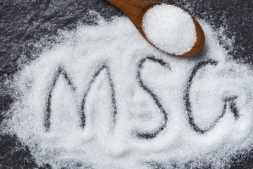
A healthy diet resolution in the New Year may include eating more fruits, nuts, and fermented foods like kombucha. But you may want to rethink what you eat if you are one of the millions of Americans who suffer from migraines, according to new research.
“Many foods that benefit our bodies contain natural or added compounds that can cause painful headache and migraine attacks,” said Dr. Fred Cohen, Assistant Professor of Medicine and Neurology at the Icahn School of Medicine at Mount Sinai in New York, and co-author of the new study. “Some contain histamine, phenylethylamine, and tyramine, which are established headache triggers. Caffeine presents a unique case; it can trigger headaches in some individuals, yet for others, it serves as an effective treatment for their headaches. Monosodium glutamate (commonly referred to as MSG) has garnered much controversy, not just as a headache trigger, but also a cause of numerous ailments such as indigestion, palpitations, chest pain and tightness, flushing, and dizziness.”
Although often primarily associated with Chinese food, MSG can be found in a wide range of other cuisines, as well as in processed foods and snacks. Dr. Cohen’s December 2023 article “Unraveling the MSG‑Headache Controversy: An Updated Literature Review” explores the evidence connecting MSG and headaches. Dr. Cohen delves into the history of "Chinese Restaurant Syndrome" (CRS), a questionable term from the late 1960s that exclusively associates Chinese food with a range of unsettling symptoms, including headaches, bloating, nausea, and chest pain. Since then, there has been confusion over which foods contain MSG and if there is any correlation.
“While there are several MSG studies that demonstrate a statistically significant increase in headaches when compared against placebo, the evidence is still mixed and further research is needed,” said Dr. Cohen. “For individuals who are worried that MSG could be a trigger for them, an elimination diet might serve as an effective diagnostic method.”
Cohen explains that an elimination diet involves the exclusion of a suspected dietary component for a period of 4–6 weeks to analyze how it affects an individual’s symptoms. If there is no noticeable improvement in headache symptoms after the removal of MSG, then it is likely that MSG is not a contributing factor to their headaches. It is paramount for the individual to ensure that their diet is free of MSG, as there might be various foods and/or additives containing it to which they are unaware.
“It is a common misnomer that Chinese and other Asian cuisines are the most common sources of MSG,” adds Dr. Cohen. “Many fast-food and chain restaurants frequently contain MSG in their dishes. In fact, MSG use in the USA is widespread and often found in frozen vegetables, condiments, breakfast cereals, spices such as Sazón, a popular seasoning used in Hispanic dishes, and even baby food.”
Below are common dietary components that can trigger a headache:
Caffeine - coffee, tea, chocolate, and certain soft drinks
Alcoholic beverages, particularly red wine, beer, and spirits
Dairy products - milk, yogurt, ice cream, and aged cheeses (blue cheese, cheddar, feta, and Parmesan)
Nitrates found in processed meats like hot dogs, sausages, and deli meats
Citrus fruits - oranges, lemons, limes, and grapefruits
Artificial sweeteners - aspartame and sucrose, often found in diet sodas, fast food and baked goods
Tyramine-rich foods - aged meats, smoked fish, fermented foods (sauerkraut, pickles, kimchi, and kombucha), and certain beans
Onions or foods cooked with onions, green onions, and shallots
Nuts and legumes - peanuts, walnuts, almonds, and cashews
Gluten - breads, baked goods, cereals, barley, and rye
Further, diets such as the Mediterranean, plant-based, and gluten-free, among others, have been found to potentially decrease the frequency of headaches and migraines.
"I always advise my patients that each individual's headaches are unique, as are their treatments. What is effective for one person may not be for another. This is especially true for dietary triggers, which can vary greatly from person to person," said Dr. Cohen. “Lifestyle changes may also be beneficial for controlling migraines, including proper sleep, regular exercise, and managing other migraine triggers such as stress and allergies.”
Dr. Cohen concludes that while much about migraines remains unknown, new medications and individualized treatment plans have been successful in reducing the number of headaches for many patients.
“I encourage everyone to work with their healthcare providers to find the unique and customized solution that works best for them,” he concludes.
As a life-long headache sufferer, Dr. Cohen is committed to helping others break free of pain. For more information visit Dr. Cohen’s website and follow him on Twitter, Instagram and TikTok.
About Dr. Fred Cohen
Fred Cohen, MD, is one of the few headache specialists in the U.S. trained in both Internal Medicine and Headache Medicine. Based in New York, NY, the world-renowned Headache Specialist is Assistant Professor of Medicine and Neurology at the Icahn School of Medicine at Mount Sinai. Dr. Cohen is Assistant Editor of Headache: The Journal of Head and Face Pain and Current Pain and Headache Reports. His research and expertise have made him a highly sought after presenter at headache conferences around the world. For more information visit www.fredcohenmd.com.